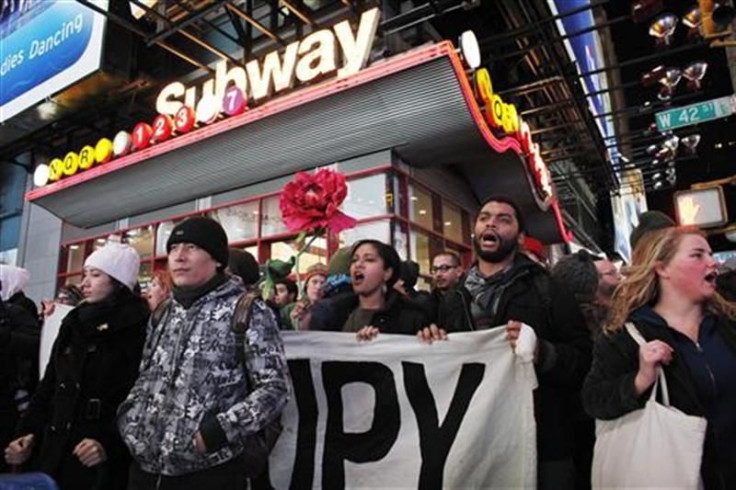Analysis: Economy Shedding Debt but Shackled by Pessimism

Americans are making progress in working down their heavy debt burden, but they are struggling to break out of another funk holding back the economy: their deep pessimism.
Some economists point to a big drop in household debt as a sign that American consumers -- once considered the driving force of the world economy -- are primed to return to more spendthrift ways.
But standing in the way of a stronger recovery, and possibly President Barack Obama's re-election as well, are unprecedented levels of concern that better days may not lie ahead.
Research suggests that economic growth will suffer from a sinking feeling among consumers that their incomes will continue to lose ground to inflation. Even though households are digging themselves out of debt, the painful 2007-2009 recession could leave a lasting scar on their willingness to spend.
Given people's expectations, the outlook going forward does not suggest much upside for consumption, said Jeff Greenberg, an economist at Nomura in New York. A lot of people will be radically different consumers.
Polls show record levels of pessimism about future income despite slow improvements in the economy. Indeed, Gallup surveys have found Americans are even gloomier about their finances now than they were during the recession's darkest days.
Americans should be feeling better. They have made big strides whittling down the mountain of debt left after the explosion of the housing bubble and the subsequent recession.
Debt payments have already fallen to the smallest fraction of income since 1994. Households spent 11.09 percent of after-tax income servicing their debt in the third quarter. In 2007, that rate hit a record high 14 percent.
Many borrowers have been helped by the Federal Reserve's push to lower interest rates. Others are simply walking away from mortgages.
PROTRACTED MALAISE
Shaking the painful debt hangover is widely seen as crucial for getting the economy growing faster again. But it might not be enough.
Derek Thompson, a salesman at a credit card company in Fort Lauderdale, Florida, recently refinanced his mortgage to lower his monthly payments. But given a sobering outlook for future income, he says he will use the extra money to pay off other debts rather than buy new stuff.
Thompson needs to start paying off the $50,000 he borrowed to get a bachelor's degree in criminal justice, and he plans to switch careers to get into law. At the same time, he fears he will take a pay cut due to a tough job market.
I want to wait until the financial situation straightens out a bit before I make any other changes, he said.
Thompson is far from alone in his unease over the economy.
Americans' median guess of how much their incomes would rise in the coming 12 months fell to 0.2 percent this month, the lowest in records going back to 1978, according to the Thomson Reuters/University of Michigan sentiment survey.
That reading cratered in late 2008 after the collapse of U.S. investment bank Lehman Brothers.
Views on wage gains never recovered, and now only 8 percent of Americans expect incomes to grow faster than inflation over the next year.
Perhaps even more worrisome, views of future inflation-adjusted income have been moving lower since around 2003, a trend that was only exacerbated by the recent recession.
That bodes poorly for growth.
Research by JPMorgan economist Michael Feroli found inflation-adjusted income expectations might be the best single indicator for predicting future consumption.
His crunching of real income expectations implicit in the University of Michigan survey found they correlated better with spending growth than changes in the stock market, wider measures of consumer sentiment or even the actual growth in people's wages.
This is scary not just because pessimism is so rampant, but because top policymakers like Obama and Fed Chairman Ben Bernanke have limited sway over the national mood.
People [need] to really believe that sustained strong growth is coming, which is like solving a problem by presuming its solution, Feroli said. It's hard for the Fed to directly affect households' psychology regarding their real income expectations.
Other recent research also points to the importance of expectations, suggesting that shifts in the collective mood may have been the driving force behind the ups and downs of the U.S. economy over the last six decades.
Working together, economists from the University of British Columbia, City University of Hong Kong and the Dallas Federal Reserve Bank found that positive turns in sentiment led to substantial pick-ups in investment and hours worked. The opposite held for a souring mood.
It seems hard to imagine a quick turnaround in the current malaise.
Feroli suggests that allowing a little extra inflation could prompt people to buy more homes and boost investment, perhaps leading to more growth and optimism. Others propose tax cuts or more government spending to get more money in people's pockets.
Both ideas face big hurdles, with lawmakers currently embracing austerity and central bankers at the Fed divided over how much inflation can be tolerated.
Yet the national mood has shifted quickly before. In the early 1980s, after a tumultuous period marked by recession and high inflation, Americans suddenly began to believe in real wage gains as the Fed tamed prices and then-President Ronald Reagan cut taxes and boosted military spending.
It's amazing how quickly it can turn around, said Hersh Shefrin, an economist and professor of behavioral finance at California's Santa Clara University.
(Reporting By Jason Lange; Editing by Chizu Nomiyama; and Jan Paschal)
© Copyright Thomson Reuters 2024. All rights reserved.











